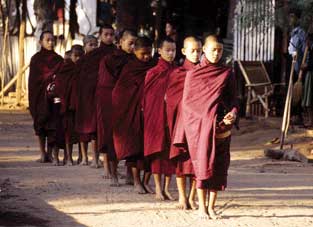
|
|
|
Home Asia Pacific South East Asia Myanmar Myanmar Protest News Burmese monks in Thailand pace, pray and waitby Anna Sussman and Jonathan Jones, Chronicle Foreign Service, March 5, 2008
Mae Sot, Thailand -- Wrapped in orange robes, Oh Bah Seh, a Buddhist monk, shows a visitor a scar on his head - compliments of a police baton.
When security forces swept the countryside raiding monasteries, the 58-year-old Oh Bah Seh and hundreds of other monks and dissidents went into hiding. Some fled on foot through the jungles of eastern Burma to Thailand, where they now live in this border city. Five months after their bloodied faces were splashed across newspapers and television sets around the world, these exiled monks fear the world has forgotten their struggle to bring democracy to Burma, also known as Myanmar. Worried about their security, they spend their days at safe houses smoking cigarettes, pacing the floor and praying.
Indeed, the Burmese military is cracking down anew on pro-democracy activists and journalists, who are fleeing into Thailand, human rights activists say. "Let's hope for the best but prepare for the worst," opposition leader Aung San Suu Kyi said in January. That same month, at least 17 pro-democracy activists were detained, including blogger Nay Phone Latt and poet Saw Wai. More than 700 people arrested during the September protests still languish in prison, and more than 80 people have disappeared, according to Amnesty International. Meanwhile, Burmese youths distribute anti-junta posters and leaflets; poets and bloggers sneak anti-military messages into their writings, and clandestine DVDs depicting the sermons of 70-year-old Abbot Nyanissara are being distributed across Burma. The abbot is known for allegories about the inevitable downfall of oppressive regimes, according to the Alternative Asean Network on Burma, a Bangkok-based network of nongovernmental organizations that support Burmese democracy. Despite the backlash, the junta announced on state television last month that it had passed a law to prepare the country for general elections in 2010. The declaration, however, provides little consolation for some pro-democracy advocates. "The reality is the government is taking this country to referendum at gunpoint," said Debbie Stothard of the Alternative Asean Network on Burma. "Conditions are worsening inside. If they want real progress, some fundamental things need to be done. They need to stop locking people up." The government is also harassing Buddhist monks and their relatives and supporters, rights activists say. The father and brother of U Gambira, leader of the All Burma Monks Alliance, were recently detained, according to the Thailand-based Assistance Association for Political Prisoners. And Agga Nya Na, a 23-year-old monk who fled to Thailand from Rangoon, says soldiers are scouring villages and circulating photos of monks they are seeking. A Burmese dissident, who spoke on the condition of anonymity, said soaring inflation has also placed many food and basic staples out of the reach of most Burmese. The Free Burma Rangers, a humanitarian group that works in eastern Burma where separatist wars with the military have raged for years, says at least 25,000 displaced people in conflict zones are facing starvation. Indeed, Oh Bah Seh says the September protests were sparked by acute food and fuel shortages caused by a 40 percent annual inflation rate. The majority of Burmese citizens subsist on an average annual income of less than $200. "We saw how little food the people had, we saw their suffering," said Oh Bah Seh. "They didn't even have a handful of rice to give us (on our alms rounds)." The "Saffron Revolution" in September follows a long tradition of clerical protest in Burma, dating back to British colonial days, when Buddhist monks fought for independence. Today, the clergy wields considerable influence, and its 400,000 monks are outnumbered only by the military's estimated 500,000 members. The protests spiraled after Oh Bah Seh and a group of monks from the town of Pakokku refused the government's daily offerings of rice, a small gesture of resistance against the dictatorship. When the Pakokku monks were beaten by police, their defiance escalated into nationwide demonstrations in which hundreds of thousands took to the streets, demanding an apology, the release of Aung San Suu Kyi from house arrest and relief from the economic crisis. "We saw the suffering," said Oh Bah Seh, who says he and the others will remain in Thailand until the military regime steps down. "We decided to do something simple." |
 Get your Korean Buddhist News here, brought to you by BTN-Buddhist Channel |
 |
 The Mandala app brings together Buddhist wisdom and meditation techniques with the latest insights of psychology and neuroscience to handle the challenges and complexities of modern life. The App offers a series of engaging talks and conversations with experts on a wide variety of topics, such as managing stress, dealing with adversity, developing greater resilience, cultivating empathy and compassion, creating healthy relationships, and many more. These topics are explored to help find greater peace, meaning and joy in our lives. Our panel of experts include Dr, Thupten Jinpa, Daniel Goleman, Kelly McGonigal and others.FREE DOWNLOAD here |
| Point
your feed reader to this location |
| Submit an Article |
| Write to the Editor |

 "We were chanting the loving kindness prayer, and the military police began to beat us," he said, referring to the protest marches against the military junta led by Buddhist monks that rocked Burma for eight days in September. "My head cracked open."
"We were chanting the loving kindness prayer, and the military police began to beat us," he said, referring to the protest marches against the military junta led by Buddhist monks that rocked Burma for eight days in September. "My head cracked open."